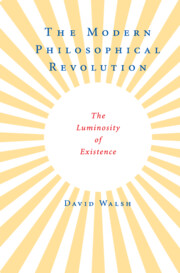Book contents
- Frontmatter
- Contents
- Preface
- Introduction
- 1 Kant's “Copernican Revolution” as Existential
- 2 Hegel's Inauguration of the Language of Existence
- 3 Schelling on the Beyond of Existence
- 4 Nietzsche: Philosophy as Existence
- 5 Heidegger's Achievement Despite the Betrayal of Philosophical Existence
- 6 Existence Without Refuge as the Response of Levinas
- 7 Derrida's Dissemination of Existence as Différance
- 8 Kierkegaard's Prioritization of Existence over Philosophy
- Epilogue: Modernity as Responsibility
- Works Cited
- Select Bibliography of Secondary Sources
- Index
4 - Nietzsche: Philosophy as Existence
Published online by Cambridge University Press: 05 June 2012
- Frontmatter
- Contents
- Preface
- Introduction
- 1 Kant's “Copernican Revolution” as Existential
- 2 Hegel's Inauguration of the Language of Existence
- 3 Schelling on the Beyond of Existence
- 4 Nietzsche: Philosophy as Existence
- 5 Heidegger's Achievement Despite the Betrayal of Philosophical Existence
- 6 Existence Without Refuge as the Response of Levinas
- 7 Derrida's Dissemination of Existence as Différance
- 8 Kierkegaard's Prioritization of Existence over Philosophy
- Epilogue: Modernity as Responsibility
- Works Cited
- Select Bibliography of Secondary Sources
- Index
Summary
Schelling's recognition that philosophy could no longer be contained in books marked a turning point in the modern revolution. He continued to draw together vast amounts of material in his lectures on mythology and revelation, but he no longer thought they could be reduced to the stability of the printed word. The living process that Hegel sought, with misgivings, to reproduce in literary form could be apprehended only in the process of life itself. In the viva voce format of the lecture, there was at least the possibility of intimating the nonobjective truth that was bound to be misconceived in the fixity of the page. If the whole point of philosophy had become the inwardness that grounded but, for that very reason, lay beyond saying, it would surely be the height of inconsistency to yield to the temptation to express the inexpressible. The position of Schelling in the history of modern philosophy derives in no small measure from his recognition of the full revolutionary significance of this insight. After him philosophy lost its speculative and synthetic ambitions to become fully existential. At the same time, it is because of his own resolute fidelity to the existential imperative that his significance has been so widely overlooked. In the absence of any mature literary formulations, his example remained simply that. His great successors, Nietzsche and Kierkegaard, either neglected or dismissed him, to define themselves in opposition to an earlier phase of idealist philosophy, represented by Schopenhauer and Hegel, when confidence in the capacity for definitive literary statement had not been so disrupted.
- Type
- Chapter
- Information
- The Modern Philosophical RevolutionThe Luminosity of Existence, pp. 178 - 231Publisher: Cambridge University PressPrint publication year: 2008



